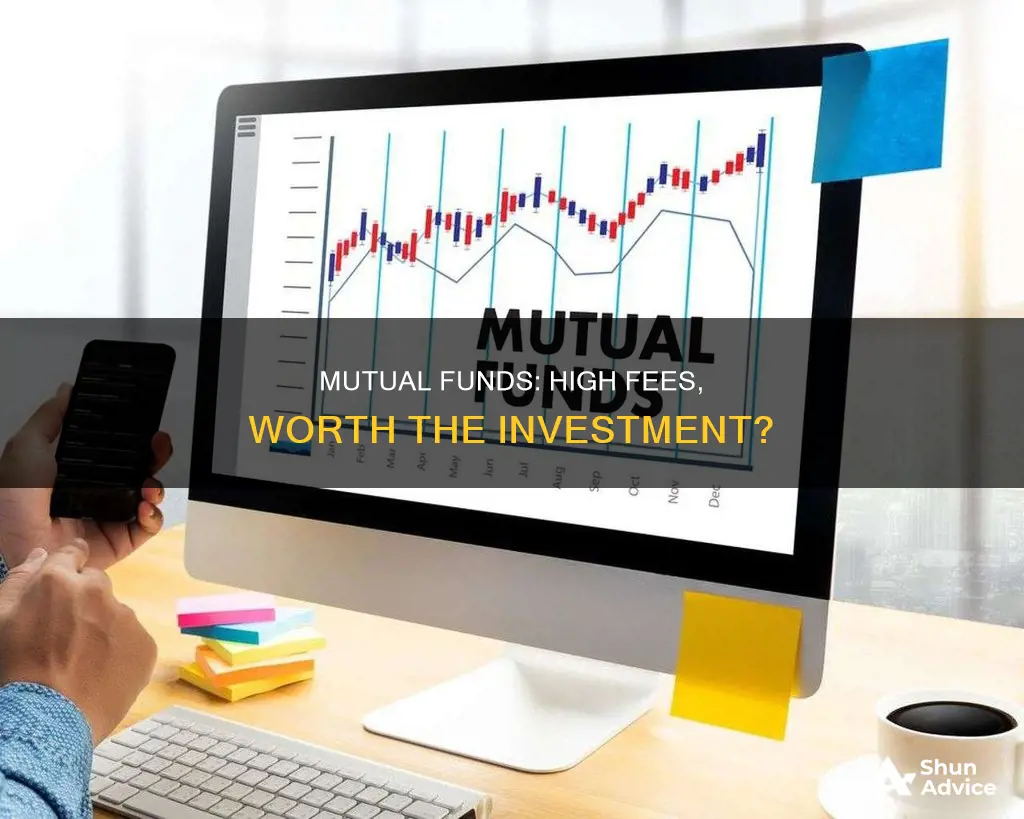
Mutual funds are a popular investment vehicle, but they come with fees that can impact your returns. These fees are called expense ratios and are charged by the fund company to manage the fund. While some funds are actively managed by portfolio managers who try to beat benchmark indexes, others are passively managed and simply track an index. Actively managed funds generally have higher fees than passively managed funds. When deciding whether to invest in a high-fee mutual fund, it's important to consider the fund's performance, the expertise of its management team, and your own investment goals and risk tolerance. High fees can eat into your returns, so it's crucial to understand the different types of fees and how they can impact your investments over time.
| Characteristics | Values |
|---|---|
| Type of fund | Actively managed funds |
| Investment type | Stocks, bonds, money market instruments, balanced funds, target date funds, commodities, real estate, early-stage companies |
| Performance | Outperform market benchmarks |
| Investment strategy | Fundamental analysis, quantitative analysis |
| Fund size | Small-cap, large-cap, international |
| Trading costs | Higher for small-cap funds |
| Administrative costs | Custodial, legal, accounting, transfer agent, other administrative costs |
| Distribution costs | 12b-1 fee |
| Sales loads | A-class, B-class, C-class shares |
| Redemption fee | Charged if shares are sold within a short period of time after purchasing |
| Exchange fee | Charged for transferring shares to another fund |
| Account fee | Charged if balance falls below a minimum investment amount |
| Purchase fee | Charged at the time of purchase |
What You'll Learn

Active vs passive funds: pros and cons
Passive investing is a strategy that aims to maximise returns by minimising the costs of buying and selling securities. It is typically done by investing in a mutual fund or exchange-traded fund (ETF) that mimics a benchmark index, such as the S&P 500. Passive investing is less expensive, simpler, and often produces better after-tax results over medium to long time horizons. It is a good option for hands-off investors who want returns with less risk over a longer period.
Passive Funds: Pros
- Lower fees: Passive funds have lower operating costs since they don't need to pay for extensive research and analysis.
- Transparency: It is clear which assets are in an index fund.
- Tax efficiency: The buy-and-hold strategy of passive funds typically results in lower capital gains tax.
Passive Funds: Cons
- Lack of flexibility: Passive funds are limited to a specific index or set of investments and cannot adapt to market changes.
- Smaller potential returns: Passive funds rarely outperform their benchmark index and usually return slightly less due to operating costs.
Active investing, on the other hand, involves a hands-on approach and aims to beat the average market returns by taking advantage of short-term price fluctuations. Active investors analyse investments and make buying and selling decisions based on price changes and returns.
Active Funds: Pros
- Flexibility: Active investors can buy any investment they believe will perform well and are not restricted to a specific index.
- Hedging: Active investors can use various strategies, such as short sales or put options, to manage risk.
- Tax management: Active investors can employ tax management strategies, such as selling losing investments to offset taxes on winning investments.
Active Funds: Cons
- Higher costs: Active investing involves higher transaction costs, research fees, and management salaries, which can impact overall returns.
- Poor track record: Data shows that only a small percentage of actively managed funds consistently outperform passive funds over the long term, especially after accounting for taxes and fees.
In summary, passive investing is generally more cost-effective and often provides better returns over the long term, while active investing offers more flexibility and tax management opportunities but comes with higher fees and a higher risk of underperformance.
Stash Invest Account: Funding Your Future in a Few Steps
You may want to see also

Fees and sales charges
Mutual fund fees generally fall into two categories: Annual fund operating expenses and shareholder fees. Annual fund operating expenses are ongoing fees charged by the fund to cover the cost of management, accounting, legal fees, marketing, and other operational costs. These fees are typically expressed as a percentage of the fund's net average assets and can vary widely depending on the type of fund. Actively managed funds, for example, tend to have higher fees than passively managed funds.
Shareholder fees, on the other hand, are one-time costs incurred when buying or selling mutual fund shares. These include sales loads or commissions paid to brokers, which can be charged at the time of purchase (front-end load) or upon selling the fund (back-end load). Some funds may also have deferred sales charges, often imposed to discourage short-term trading.
When evaluating mutual fund fees, it's important to consider the fund's performance and whether the fees are justified. In some cases, high-fee funds may offer superior performance or access to niche investment areas that justify the higher costs. However, it's generally recommended to seek funds with lower expense ratios, as higher fees can eat into your investment returns over time.
Additionally, it's worth noting that some brokers offer no-load and no-transaction-fee mutual funds, which can help reduce the overall costs of investing in mutual funds. By choosing funds with lower fees and expenses, you can improve your investment performance and maximize your returns.
Small-Cap Funds: When to Invest and Why
You may want to see also

High-yield savings accounts
The Pros of High-Yield Savings Accounts
Unlike certificates of deposit (CDs), which lock in your money for a fixed term, high-yield savings accounts allow you to withdraw and transfer funds without any penalties, making them a more flexible option for your short-term financial goals. They also usually come with no monthly fees and low (or no) minimum deposit or balance requirements, making them accessible to a wide range of savers.
The Cons of High-Yield Savings Accounts
One of the main drawbacks of high-yield savings accounts is that interest rates are variable and can change at any time. While you can grow your money, it may not be the best option for long-term wealth generation, as the yield often doesn't keep up with inflation. Fees and minimum balance requirements can also eat into your returns. For example, some accounts offer a higher APY only if you maintain a certain balance or meet specific deposit requirements. Additionally, while there may be no limit on the amount you can withdraw, there are often caps on the number of transactions allowed per statement cycle.
Most high-yield savings accounts are offered by online-only financial institutions, so if you prefer in-person banking and having a physical branch to visit, this could be a disadvantage.
Mutual Funds: Investors Seek Diversification and Professional Management
You may want to see also

Tax events
Mutual funds are taxed like any other investment. The type of account you own will determine what is taxable each year. Retirement accounts, for example, are tax-deferred and only taxed when you withdraw assets. For taxable non-retirement accounts, fund distributions are also subject to taxation.
There are four types of distributions:
- Ordinary income (ordinary dividends)
- Qualified dividends
- Capital gain distributions
- Non-dividend distributions (Return of Capital)
If you sell shares in a mutual fund, you have triggered a taxable event, unless the exchange occurred within a tax-deferred retirement plan. The length of time shares have been owned will affect how any gains from a sale are taxed. If shares were purchased and held for more than a year before the sale, it's generally considered a long-term capital gain, which typically receives more favourable tax treatment than short-term gains.
If you sell mutual fund shares for a loss, you may be able to use that loss to offset other capital gains on your tax return. You may deduct up to $3,000 annually.
If you exchange one fund for another in a taxable account, you are selling the shares of one fund and using those proceeds to purchase the shares of the other fund. Therefore, the exchange will have tax consequences if you have a gain or loss in the fund you are selling. An exchange between funds within a retirement account does not create a taxable event.
Mutual fund transactions must be reported on your tax return, and the appropriate taxes must be paid on each type of fund income. If you hold mutual fund shares in non-retirement accounts, you may be surprised to get a capital gains distribution from the fund. You have no control over the size of the distribution, so it's best to own mutual funds in retirement accounts where you won't have to worry about the taxes.
Angel Broking: Index Funds Investing Simplified
You may want to see also

Index funds vs mutual funds
Index funds and mutual funds are both investment options that pool investors' money into a large basket. However, there are some key differences between the two.
Management Style
Index funds are passively managed, meaning they track a specific list of securities (such as stocks of S&P 500-listed companies) without much human intervention. On the other hand, mutual funds are actively managed, with a fund manager or management team making all the investment decisions. They are free to shop for investments across multiple indexes and within various investment types.
Investment Objective
The sole objective of an index fund is to mirror the performance of the underlying index. In contrast, the objective of an actively managed mutual fund is to outperform the index and achieve higher returns by having experts pick investments they think will beat the market.
Cost
Index funds have lower investment costs compared to actively managed funds. They do not require active management, so the fees and expense ratios tend to be lower. Mutual funds, on the other hand, typically have higher fees because of the cost of paying managers, accountants, legal fees, marketing, and other expenses. These fees are bundled into the mutual fund expense ratio, which is deducted from the investor's annual returns.
Performance
Over the long term, index funds have a better shot at achieving higher returns than actively managed mutual funds. This is because it is extremely difficult for fund managers to consistently outperform the market year after year. However, there are some fund managers who do beat the market, especially in the short term when the overall market is down.
Taxes
Index funds also tend to be more tax-efficient than mutual funds. However, some mutual fund managers can offset gains against losses and hold stocks for at least a year, resulting in lower long-term capital gains taxes.
Flexibility
Mutual funds offer more flexibility in terms of investment choices and the potential for higher gains. Index funds provide less flexibility and choice, with steadier but potentially lower gains.
Suitability
Index funds are suitable for those who want a "set it and forget it" investment option. Mutual funds, on the other hand, are better for those who want the potential upside of a professionally managed fund or want to invest in specific industries.
Equity Funds: Safe Investment or Risky Business?
You may want to see also







